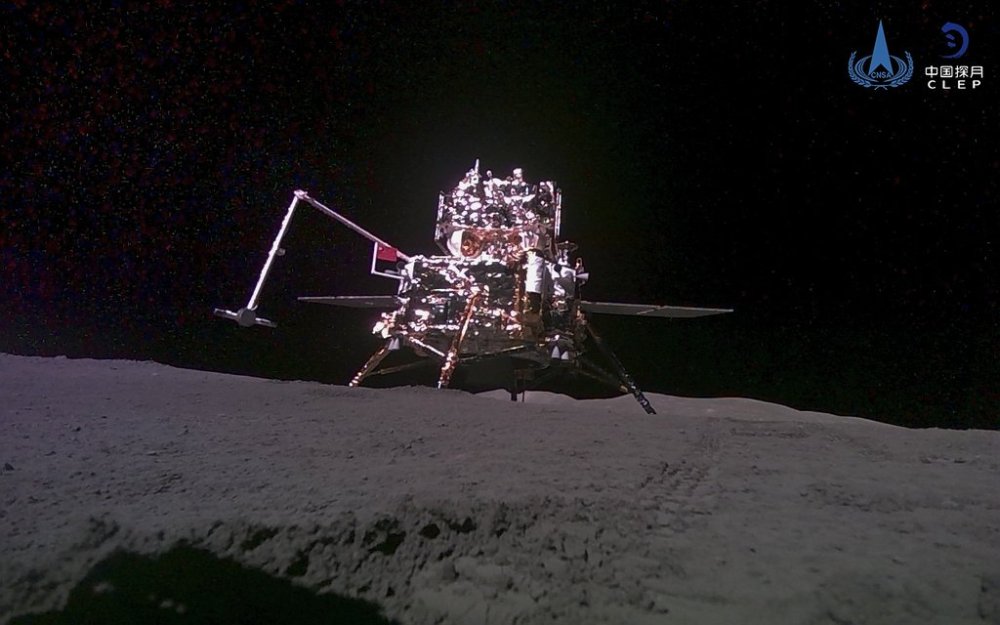China launches spacecraft it says will return samples and yield ‘groundbreaking discoveries’
Advertisement
Read this article for free:
or
Already have an account? Log in here »
To continue reading, please subscribe:
Monthly Digital Subscription
$0 for the first 4 weeks*
- Enjoy unlimited reading on winnipegfreepress.com
- Read the E-Edition, our digital replica newspaper
- Access News Break, our award-winning app
- Play interactive puzzles
*No charge for 4 weeks then price increases to the regular rate of $19.00 plus GST every four weeks. Offer available to new and qualified returning subscribers only. Cancel any time.
Monthly Digital Subscription
$4.75/week*
- Enjoy unlimited reading on winnipegfreepress.com
- Read the E-Edition, our digital replica newspaper
- Access News Break, our award-winning app
- Play interactive puzzles
*Billed as $19 plus GST every four weeks. Cancel any time.
To continue reading, please subscribe:
Add Free Press access to your Brandon Sun subscription for only an additional
$1 for the first 4 weeks*
*Your next subscription payment will increase by $1.00 and you will be charged $16.99 plus GST for four weeks. After four weeks, your payment will increase to $23.99 plus GST every four weeks.
Read unlimited articles for free today:
or
Already have an account? Log in here »
Hey there, time traveller!
This article was published 29/05/2025 (190 days ago), so information in it may no longer be current.
TAIPEI, Taiwan (AP) — China launched a spacecraft that promises to return samples from an asteroid near Mars and yield “groundbreaking discoveries and expand humanity’s knowledge of the cosmos,” the country’s space agency said.
The Tianwen-2 probe launched early Thursday from southern China aboard the workhorse Long March 3-B rocket. The probe will collect samples from the asteroid 2016HO3 and explore the main-belt comet 311P, which lies even farther from Earth than Mars, according to the China National Space Administration.
Shan Zhongde, head of the CNSA, was quoted as saying the Tianwen-2 mission represents a ”significant step in China’s new journey of interplanetary exploration” and over its decade-long mission will “yield groundbreaking discoveries and expand humanity’s knowledge of the cosmos.”

Samples from 2016HO3 are due to be returned in about two years. The asteroids, chosen for their relatively stable orbits, hopefully will offer clues into the formation of Earth, such as the origins of water.
China earlier returned rock samples from the moon’s far side back to Earth in a historic mission and has welcomed international cooperation. However, any cooperation with the U.S. hinges on removing an American law banning direct bilateral cooperation with NASA.
The near side of the moon is seen from Earth and the far side faces outer space. The far side also is known to have mountains and impact craters and is much more difficult to reach.
China also operates the three person-crewed Tiangong, or “Heavenly Palace,” space station, making the country a major player in a new era of space exploration and the use of permanent stations to conduct experiments in space, especially since the station was entirely Chinese-built after the country was excluded from the International Space Station over U.S. national security concerns.
China’s space program is controlled by the People’s Liberation Army, the military branch of the ruling Communist Party.
The country’s space program has grown rapidly in the more than 20 years since it first put a man in space, only the third country to do so under its own speed. The space agency has landed an unmanned explorer on Mars and a rover on the far side of the moon. It aims to put a person on the moon before 2030.
A future Tianwen-4 Jupiter mission will explore Jupiter, although details haven’t been released.

